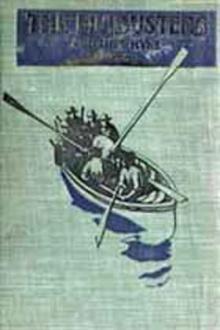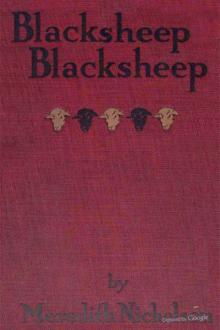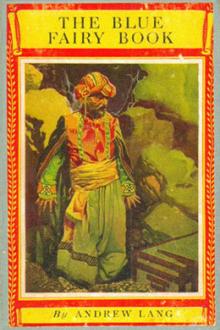The Filibusters, Charles John Cutcliffe Hyne [best book clubs .TXT] 📗

- Author: Charles John Cutcliffe Hyne
- Performer: -
Book online «The Filibusters, Charles John Cutcliffe Hyne [best book clubs .TXT] 📗». Author Charles John Cutcliffe Hyne
“I know it, General, and I am sorry. We came as soon as we could. We didn’t stop to loot a thing, but the road was blocked by troops in four places, and we had to fight our way through. We killed about three times our own weight of them, and it cost us twenty-four men to do it. They were bad in discipline, they were nothing special as fighters, but they just rioted in numbers.”
“Well,” said the General, “you came in time to save our skins, and we have this fort, and I thank you for it.”
“What about the wounded, sir? “Davis suggested.
“For the present they must attend to themselves, poor fellows, with what help the two doctors can give. I have too few sound men left to spare a single one just now. We may be engaged again any minute. And now, gentlemen, back to your posts, please, and if you see any of the other forts below beginning to train guns on us, concentrate all your force and smash them at once. Our envoys cannot reach the nearest of them for another half-hour yet.”
The sun was high and bright by this time, and the palms and the green, heavy-laced banana leaves swung in the crisp sea-breeze. The city lay beneath us, very beautiful and very restless. The houses stood out in little dabs of white and pink and mauve amongst the greenery, and from out of the houses soared up the cathedral with its great square towers of amber-coloured stone. A bell clanged mournfully in one of its turrets.
In the streets here and there little black dots moved about hurriedly, slinking in at doors, and going at the run across the open plazas. But there were no big congregations of people; the tram-cars were stopped; and it was clear that the greater part of the folk were staying within the houses and waiting what the day might bring forth.
We, too, were expecting that same thing with no little eagerness. We were pretty well strung up by what had gone before. We were ready either for a desperate bombardment or to receive capitulation. And whatever was to come, we wanted it soon, because our wounds and our bruises were stiffening on us.
“Billy,” I heard Coffin say, ” if the music doesn’t begin again soon, or if somebody doesn’t give me the equivalent of a whisky and soda, I shall sit down in some retired corner and bust.”
“I don’t know what in the fiend’s name we’re going through all this palaver for at all,” said Carew. ” We’ve turned the position; and if we’d given each of those other forts a dose straight away we’d have blown half of them to rags and made the others surrender in a hurry. Then we should have had a good excuse to sack the town and get hold of a thing or two worth having. I bet there are lovely pickings in that cathedral. Oh Lord, if I only could get hold of that fat old priest who keeps the plate chest, and squeeze him… .”
“You sacrilegious ruffian,” said Coffin, laughing, ” there is no talk of sacking this, our very prosperous city of Los Angeles. We’re reformers, not pirates.”
“Oh, where’s the difference?”
“The reformer’s methods are far less crude than the pirate’s. He gets hold of the place first, as quickly and suavely as may be, and then tightens his grip on it, and squeezes out all the good things into his own pocket. The pirate is a person never spoken about now in decent society. There is too much red paint and pistols about him for the murder idea.”
“Look here,” said Carew, ” you’d better go and talk to Davis. Your excellent sentiments will just about suit him. They’re wasted on me: I’m past improving.”
“I don’t think that anything but a rope and a lamp-post will cure you,” said Coffin, ” and that’s a fact. But, hullo, look there. It seems as if we are going to be saved further shooting. There goes up the white flag on one of the water forts, and what’s this ‘ D. W. H. B.’ on two of the others. What does that mean? Where’s the signal book?”
Davis came up with it, and turned over the pages on the chase of a gun.
“‘D. W. H. B.’ means ‘surrendered.’”
The other forts seemed only to be waiting for the lead. Another white flag fluttered up to one of the redoubts on the heights, and from two others ‘ D. W. H. B.’ broke out in splashes of gaudy colour. The others followed within a minute or so. The defences of Los Angeles had all capitulated: it only remained for us to take possession.
Just about that time, with a clatter of hoofs and a jangle of harness, Fluellen’s battery came to us up one of the forest roads. A sergeant, a fellow from Matabeleland, was in command, and Fluellen lay a limp, senseless mass across one of the limbers. They had met with the worst kind of luck. Their plans had been forestalled. They had been beset by masses of troops at every point, and it was only by a marvel of pluck and cleverness that they escaped annihilation. They lost half their numbers in these fierce attacks, and when at last they did get through, it was only to meet with a crushing disappointment. The Nuca del Diabolo had been guarded in a way there was no getting over. The lower ledges, by which, time before, Briggs had climbed to the summit, had been blasted away by dynamite charges. The foot of the crag was made into a smooth precipice a hundred feet in height.
The Sacaronducan troops were waiting for them even there, and in repelling their last desperate assault, Fluellen fell with a bullet through his side.
“Coffin,” said the General, ” I shall leave you here in the post of honour to hold this fort for me and keep command of the city. You will have five and thirty sound men and both the doctors, and you will do all you can for the wounded. Possibly you can set small squads of prisoners to work helping you. Do so if you see a chance, and any way treat them well. I wish to gain the army over to my side if it can be done, because then it will cost far less life to win the country.”
Even with the total submission of the troops for the three regiments in garrison followed the example of the artillery our day’s work was a heavy one. The soldiers marched into the great plaza where our Maxim batteries were drawn up, piled their arms, and marched off to the two large warehouses where they were billeted under guard. The arms were carried up in mule-waggons to Carew’s post, as were also the breechblocks of the great guns in the other forts; and in fact the means of offence was taken away from the city as thoroughly as possible, and yet without doing any unnecessary damage. The General’s policy was to carry matters with the firmest possible hand, but yet at the same time to leave everything free for conciliation.
Then began the political movement.
In the ordinary course of events a great ball was to have taken place in the city two evenings after our landing, in aid of a charity. In the scare which followed it was very natural that this should be forgotten by some entirely, and dropped by others through the press of greater excitements. But it did not suit the General’s book that this ball should fall through. He got the list of acceptances, and sent out invitations to all the considerable people of the city who had not already got tickets, with the significant rider that a non-appearance would be construed into a personal slight.
Now dancing is not in my way, and accurately speaking I should not say it was in the General’s; but he was a man who was quite ready to turn his hand to anything at all in reason which would serve his ends, and I well, I was his secretary.
So to the great electric-lighted operahouse we both went in accurate evening dress, the General wearing the order of the Gem-Orchid of Sacaronduca, with its crimson ribbon at his throat.
The whole affair was frankly political. Twenty of our chaps splendid-looking soldiers they were, too formed a guard of honour up the two sides of the grand staircase. The General stood at the top before a small knot of notables, and as each group came up, a steward told me their names, and I presented them formally. I was anxious to hand that duty on to Davis, and the General was quite willing; but Davis (after vast consideration and a careful study of the subject in some abominable work on etiquette) stammered out some yarn to the effect that he was not sufficiently certain of himself, and dreaded that he might commit some ” faux pas.” For a man whose one ambition of life was to advance himself socially, Davis was singularly nervous and diffident.
The General, of course, here was called by the Spanish form of his name, Don Esteban Puentos, and mixing with the people, I was astonished to find what a strong reputation he had made for himself during his previous life in the country. One fierce partisan of his (a lady, by the way) said to me, ” Senor, he was the man of the moment when he left us; now that he comes back we look to him as a second Bolivar.”
“That is very well,” I said; ” but, what is more to the point, will the country assist to liberate itself?”
“Certainly it will,” she answered. ” The troops you conquered yesterday will be ready enough to help on your side tomorrow. Fighting is their trade, but fighting against such Paladins as your young gentlemen have proved themselves to be is an occupation too dangerous to be steadily profitable. Offer them arms, and they will be enthusiastic in your support.”
“That doesn’t sound very moral,” I said.
“Mais que voulez-vous?” (are they not soldiers that we speak about?) she replied.
“Say, rather,” suggested a little woman in pince-nez who joined us, ” that they have fought for a bad government because it was the government, and there was no other in view. I can’t have you being rude to our service, Mr. Birch. There are some awfully nice boys in it. By the way, are you any relation to the Birches of Lisnaskea in County Waterford? I’d a great friend there once Willie Birch, that broke his neck driving home from a Cork race meeting.”
“I’m afraid I’m not Irish. Do you know that island well?”
“Born there, Mr. Birch, and lived there most of my time till I married Don Juan Carmoy. You have a Mr. Coffin with you, I’m told. Is he one of the Galway Coffins, or is he connected with the Devonshire lot?”
“He’s Irish, certainly, and I fancy he comes from the West.”
“I knew a Hugh Coffin once Wee Hugh, they called him who played number one in their county polo team, and was always getting cursed for crossing. There was always terrible language flying about the ground when Wee Hugh sat down to ride. He went abroad to England and other places afterwards. I wonder if he’s the same.”
“I shouldn’t wonder,” I said. ” Our man’s Hugh, I know, and he rides eight stone easily. He’s on duty to-night, but I’ll introduce him tomorrow if I may, and let him answer for himself. And now would





Comments (0)